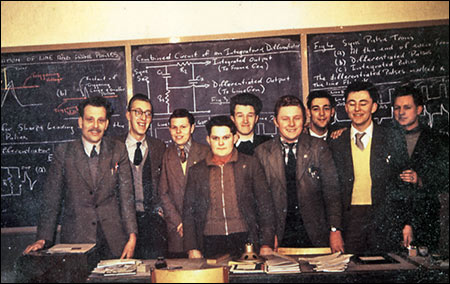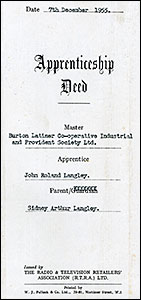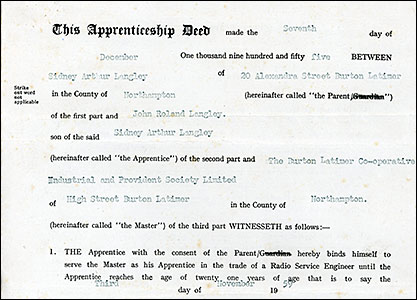| Article by John Langley 2006 |
||||
|
||||
|
||||
|
It began as a schoolboy aged 11 in 1950 when the manager of the furnishing and hardware departments Sid Blundell, who was our next door neighbour, asked me if I would like a part time job working in the hardware department. I accepted immediately. My hours were Saturday mornings 8-30am to l2-30pm and 1 hour after school My main job from September to April involved paraffin and I soon realized that this was the motive for my employment. This was a time when there were very few houses with central heating and every household had several paraffin heaters. The problem was that the paraffin was delivered to the rear of the shop in During the summer I did general tasks throughout the shop. In 1953 the Co-op put on a display of televisions in the St John Ambulance room in Also at about this time Alf Coles, who kept the tobacconist shop next door but one to the hardware shop, with one small cottage in-between, retired. The shop became the new Co-op Electrical Shop until then television sets had been sold from the furniture shop at the other end of the row next to the grocery. Howard Stokes came from Wellingborough Co-op as the branch manager, we soon became good friends and I would often go missing from the hardware shop. All of this ignited a spark in me and I decided that I wanted to be a radio and television engineer. Sid Blundell who was overall manager of the three shops agreed that I could divide my time between the hardware and electrical shops and Mr.Grove the General Secretary said that they would employ me as an apprentice in the Electrical Shop when I left school which was in July 1955. My wages for the whole five years as a schoolboy remained at five shillings. I also spent as much time as I could in the Electrical Shop during school holidays unpaid of course, and built radios at home.
I started work full time in Au 1955 at a weekly wage of 2 pounds 2 shillings I had already learned quite a lot and could do some repairs, in those days everthing we sold was repaired.I could already manage toasters, irons, hairdriers and kettles unsupervised one item I remember well which kept us very busy in December was Christmas tree lights. They would arrive in a paper bag tangled up usually with some of last years tinsell with wires and bulbs broken. Not long after I started Howard Stokes the manager left and went to work for When I was 17 I started to learn to drive on the vans whenever I had the opportunity, I carried my L plates in my toolbox because I never knew which van it would be. I passed my driving test on my 18th birthday. When I returned from my test George came out from the shop and asked if I had passed. When I said yes he said stay there and went back into the shop, he returned with a handfull of job tickets and sent me off on my first solo repairs. In 1956 the cottages either side of our shop were joined to it to extend it and we swapped with the furniture shop and our number increased to 3 when June Law became our shop assistant. At the same time as part of being an apprentice my day release course started at At Wellingborough there were 7 other students all about my age and all apprentices to Radio and Television retailers. Our tutor was Gordon Abrams an excellent teacher and a great character who started his radio career in WW2 in the RAF and flew in Bombers as a radio operator. In the afternoons we would often start to go to sleep and he would quickly wake us up with a wartime story. In July 1960 we passed our final exams and became the first City and Guilds fully qualified Radio and Television engineers in Northamptonshire. At the end of my apprenticeship my weekly wage had risen to about five pounds. There was an immediate dispute with the Mr. Waller over pay, he only agreed to pay me the adult shop assistant rate of eight pounds nineteen shillings and sixpence per week. Trade Union membership at the Co—op was compulsory and everyone at Burton Latimer except the Managers were in U.S.D.A.W. [ of Shop Distributive and Allied Workers.] However the E.T.U [ Trades Union.] rates of pay for Radio and Television engineers was several pounds higher. I said to him that if they refused to pay me the rate for the job I would leave U.S.D.A.W. and join the E.T.U. who had the reputation of being a rather militant union. He agreed to pay me E.T.U. rates from then on but would prefer me to stay in U.S.D.A.W. We sold and repaired radios, televisions and every type of electrical appliance used in the home at that time, and also did electrical repairs to their homes. Most of the older houses, certainly those built before WW1 usually had only one 15 amp power point in the whole house in the living room! In other rooms everything was connected to the light pendant on several 2 way adapters hanging down with the lamp at the bottom. Cables went in all directions even connected to heaters, with the fuse wire increased in rating to take the load and no earth, unimaginable in 2007 but that’s how it was. However with more major electrical appliances becoming available power sockets were fitted at least in kitchens. A washing machine connected to a lighting point was a step too far. From 1957 we started to hire televisions to our customers at a cost of seven shillings and sixpence per week It was very popular as televisions were often unreliable and there were no repairs to pay for. Most of our customers did this and as the years passed it became ever more popular, not just at the Co-op but nationwide with the national rental companies having large numbers of sets on hire. Not unexpectedly there was a shortage of engineers. I was contacted by one of the large TV rental companies Rentaset Ltd. They offered me 25 pounds per week, which was about double my Co-op wage at that time and unlimited overtime - there was no overtime available at the Co-op. An offer I could not refuse, so my employment with the Co-op ended in 1964. |
||||


